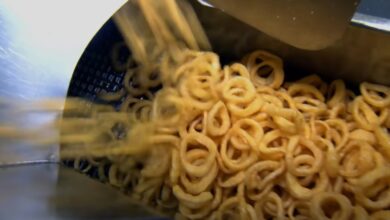Carnitas Nutrition Facts
Delving into Carnitas' nutrition facts, we invite you to join us on a compelling journey that travels beyond the taste buds and straight into the core of this beloved Mexican dish. Our expedition promises a revelation of the calories and protein that carnitas hold and a fascinating exploration of how this dish fits into an unexpectedly diverse range of dietary plans.
Carnitas, a delicious Mexican dish made from braised or roasted pork, is a popular choice for many due to its rich flavor and tender texture. Understanding the nutritional content of carnitas is essential for those who are mindful of their dietary intake. In this comprehensive guide, we will delve into the nutrition facts of carnitas, examining its macronutrients, vitamins, minerals, and overall health implications. Whether you’re a fitness enthusiast, someone managing your weight, or simply curious about what you’re eating, this article will provide you with valuable insights.

Introduction to Carnitas
Carnitas, which means “little meats” in Spanish, is a traditional Mexican dish made by simmering pork in oil or lard until tender. It’s typically seasoned with a variety of herbs and spices, such as cumin, oregano, and bay leaves, and often incorporates citrus elements like oranges. The cooking process not only imparts a rich, savory flavor but also gives the meat a crispy texture. Carnitas can be enjoyed in tacos, burritos, or as a standalone dish, making it a versatile addition to many meals.
Calories and Macronutrients
Carnitas is a protein-rich dish that provides a substantial amount of energy. Here’s a breakdown of its macronutrient content per 100 grams:
- Calories: 271 kcal
- Protein: 24.57 grams
- Fat: 18.33 grams
- Carbohydrates: 0 grams
Detailed Macronutrient Breakdown
- Total Fat: 18.33 grams
- Saturated Fat: 4.009 grams
- Monounsaturated Fat: 8.228 grams
- Polyunsaturated Fat: 2.43 grams
- Protein: 24.57 grams
- Carbohydrates: 0 grams
- Dietary Fiber: 0 grams
- Sugars: 0 grams
Carnitas is primarily composed of protein and fat, making it a suitable option for those following a low-carb or ketogenic diet. The high protein content supports muscle repair and growth, while the fats provide sustained energy.
Vitamins and Minerals
Carnitas contains a variety of essential vitamins and minerals, contributing to its nutritional value:
- Vitamin A: 2 µg (1% DV)
- Vitamin C: 0 mg (0% DV)
- Vitamin D: 1.2 µg (6% DV)
- Vitamin E: 0.28 mg (2% DV)
- Vitamin K: 1.1 µg (1% DV)
- B Vitamins:
- Thiamin (B1): 0.491 mg (41% DV)
- Riboflavin (B2): 0.358 mg (28% DV)
- Niacin (B3): 3.795 mg (24% DV)
- Vitamin B6: 0.439 mg (26% DV)
- Vitamin B12: 0.91 µg (38% DV)
Mineral Content
- Calcium: 26 mg (2% DV)
- Iron: 1.72 mg (10% DV)
- Potassium: 299 mg (7% DV)
- Magnesium: 23 mg (6% DV)
- Phosphorus: 204 mg (17% DV)
- Sodium: 440 mg (20% DV)
- Zinc: 4.74 mg (44% DV)
- Copper: 0.126 mg (14% DV)
- Selenium: 41.6 µg (76% DV)
Carnitas is particularly high in selenium, zinc, and B vitamins, all of which are crucial for maintaining a healthy immune system and metabolic functions.
Health Considerations
While carnitas is nutritious, it is important to consider its fat and sodium content. High levels of saturated fat and sodium can contribute to heart disease and hypertension if consumed in excess. Therefore, it’s advisable to enjoy carnitas in moderation and balance it with other nutrient-dense foods such as vegetables and whole grains.

Frequently Asked Questions
What is the main nutritional benefit of carnitas?
Carnitas is an excellent source of protein, providing over 24 grams per 100 grams serving. It also contains essential minerals like selenium and zinc, which support immune function.
Are there any vitamins present in carnitas?
Yes, carnitas contains several B vitamins, including thiamin, riboflavin, niacin, and vitamin B6, which play vital roles in energy metabolism and neurological health.
Is carnitas suitable for a low-carb diet?
Absolutely. With 0 grams of carbohydrates per serving, carnitas is an ideal option for those following a low-carb or ketogenic diet.
How can I reduce the fat content in carnitas?
To reduce the fat content, you can trim excess fat from the pork before cooking and opt for leaner cuts of meat. Additionally, using a smaller amount of oil or lard during preparation can help lower the overall fat content.
Conclusion
Carnitas is a flavorful and nutritious dish that can be enjoyed as part of a balanced diet. Its high protein content and rich assortment of vitamins and minerals make it a valuable addition to meals. However, due to its fat and sodium content, it should be consumed in moderation. By understanding the nutritional facts of carnitas, you can make informed dietary choices and enjoy this delicious dish while maintaining your health and wellness.
Read also: Baja Fresh Nutrition Facts





